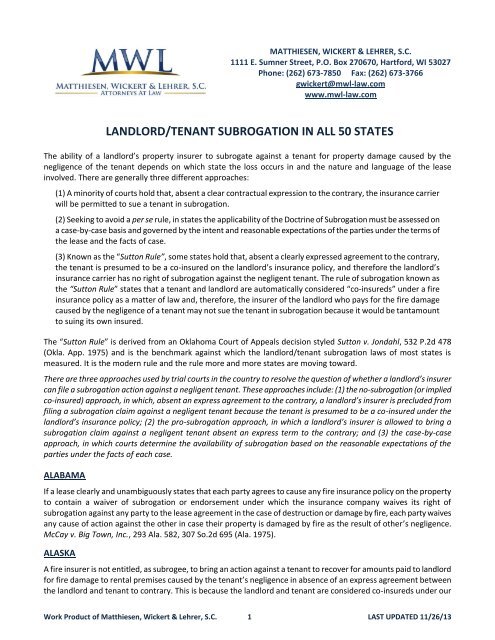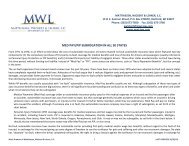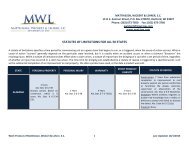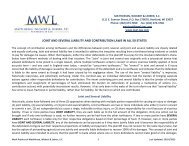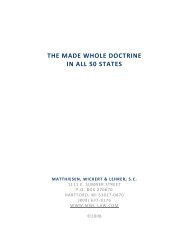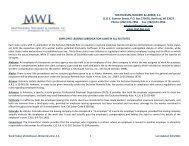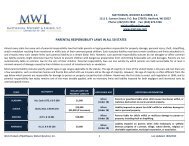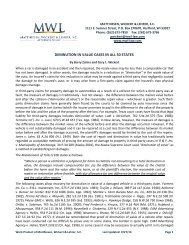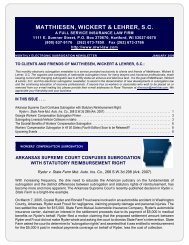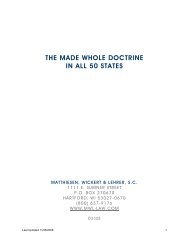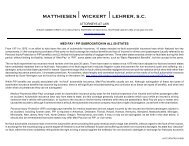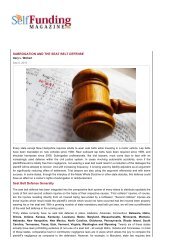Landlord/Tenant Subrogation In All 50 States - Matthiesen, Wickert ...
Landlord/Tenant Subrogation In All 50 States - Matthiesen, Wickert ...
Landlord/Tenant Subrogation In All 50 States - Matthiesen, Wickert ...
You also want an ePaper? Increase the reach of your titles
YUMPU automatically turns print PDFs into web optimized ePapers that Google loves.
MATTHIESEN, WICKERT & LEHRER, S.C.<br />
1111 E. Sumner Street, P.O. Box 270670, Hartford, WI 53027<br />
Phone: (262) 673-78<strong>50</strong> Fax: (262) 673-3766<br />
gwickert@mwl-law.com<br />
www.mwl-law.com<br />
LANDLORD/TENANT SUBROGATION IN ALL <strong>50</strong> STATES<br />
The ability of a landlord’s property insurer to subrogate against a tenant for property damage caused by the<br />
negligence of the tenant depends on which state the loss occurs in and the nature and language of the lease<br />
involved. There are generally three different approaches:<br />
(1) A minority of courts hold that, absent a clear contractual expression to the contrary, the insurance carrier<br />
will be permitted to sue a tenant in subrogation.<br />
(2) Seeking to avoid a per se rule, in states the applicability of the Doctrine of <strong>Subrogation</strong> must be assessed on<br />
a case-by-case basis and governed by the intent and reasonable expectations of the parties under the terms of<br />
the lease and the facts of case.<br />
(3) Known as the “Sutton Rule”, some states hold that, absent a clearly expressed agreement to the contrary,<br />
the tenant is presumed to be a co-insured on the landlord’s insurance policy, and therefore the landlord’s<br />
insurance carrier has no right of subrogation against the negligent tenant. The rule of subrogation known as<br />
the “Sutton Rule” states that a tenant and landlord are automatically considered “co-insureds” under a fire<br />
insurance policy as a matter of law and, therefore, the insurer of the landlord who pays for the fire damage<br />
caused by the negligence of a tenant may not sue the tenant in subrogation because it would be tantamount<br />
to suing its own insured.<br />
The “Sutton Rule” is derived from an Oklahoma Court of Appeals decision styled Sutton v. Jondahl, 532 P.2d 478<br />
(Okla. App. 1975) and is the benchmark against which the landlord/tenant subrogation laws of most states is<br />
measured. It is the modern rule and the rule more and more states are moving toward.<br />
There are three approaches used by trial courts in the country to resolve the question of whether a landlord’s insurer<br />
can file a subrogation action against a negligent tenant. These approaches include: (1) the no-subrogation (or implied<br />
co-insured) approach, in which, absent an express agreement to the contrary, a landlord’s insurer is precluded from<br />
filing a subrogation claim against a negligent tenant because the tenant is presumed to be a co-insured under the<br />
landlord’s insurance policy; (2) the pro-subrogation approach, in which a landlord’s insurer is allowed to bring a<br />
subrogation claim against a negligent tenant absent an express term to the contrary; and (3) the case-by-case<br />
approach, in which courts determine the availability of subrogation based on the reasonable expectations of the<br />
parties under the facts of each case.<br />
ALABAMA<br />
If a lease clearly and unambiguously states that each party agrees to cause any fire insurance policy on the property<br />
to contain a waiver of subrogation or endorsement under which the insurance company waives its right of<br />
subrogation against any party to the lease agreement in the case of destruction or damage by fire, each party waives<br />
any cause of action against the other in case their property is damaged by fire as the result of other’s negligence.<br />
McCay v. Big Town, <strong>In</strong>c., 293 Ala. 582, 307 So.2d 695 (Ala. 1975).<br />
ALASKA<br />
A fire insurer is not entitled, as subrogee, to bring an action against a tenant to recover for amounts paid to landlord<br />
for fire damage to rental premises caused by the tenant’s negligence in absence of an express agreement between<br />
the landlord and tenant to contrary. This is because the landlord and tenant are considered co-insureds under our<br />
Work Product of <strong>Matthiesen</strong>, <strong>Wickert</strong> & Lehrer, S.C. 1 LAST UPDATED 11/26/13
fire policy. Alaska <strong>In</strong>s. Co. v. RCA Alaska Communications, <strong>In</strong>c., 623 P.2d 1216, 1218 (Alaska 1981). However, later<br />
case law indicates that the tenant is a co-insured under the lease only if the lease expressly provides for same. Great<br />
American <strong>In</strong>s. Co. v. Bar Club, <strong>In</strong>c., 921 P.2d 626 (Alaska 1996). However, in that case, the tenant’s insurer was suing<br />
the landlord for causing the fire and the Court held that since the policy was purchased by the tenant and named<br />
only the tenant as insured, equitable principles underlying “Implied <strong>In</strong>sured Doctrine” did not apply.<br />
ARIZONA<br />
Arizona has avoided per se rules and has taken a more flexible case-by-case approach, holding that a tenant’s liability<br />
to the landlord’s insurer for negligently causing a fire depends on the intent and reasonable expectations of the<br />
parties to the lease as ascertained from the lease as a whole. General Accident Fire & Life Assurance Corp. v. Traders<br />
Furniture Co., 401 P.2d 157 (Ariz. App. 1981).<br />
ARKANSAS<br />
Arkansas has avoided per se rules and taken a more flexible case-by-case approach, holding that a tenant’s liability to<br />
the landlord’s insurer for negligently causing a fire will depend on the intent and reasonable expectations of the<br />
parties to the lease as ascertained from the lease as a whole. Page v. Scott, 567 S.W.2d 101, 103 (Ark. 1978).<br />
CALIFORNIA<br />
California has avoided per se rules with regard to the “Sutton Rule” (see Oklahoma) and taken a more flexible caseby-case<br />
approach, holding that a tenant’s liability to the landlord’s insurer for negligently causing a fire depends on<br />
the intent and reasonable expectations of the parties to the lease as ascertained from the lease as a whole. Fire <strong>In</strong>s.<br />
Exch. v. Hammond, 83 Cal. App.4 th 313, 99 Cal. Rptr.2d 596, 602 (Cal. 2000).<br />
COLORADO<br />
A landlord’s insurer may recover against a tenant only if the landlord has the right to recover against the tenant.<br />
Employers Cas. Co. v. D.M. Wainwright, 473 P.2d 181 (Colo. 1970). The ultimate question presented is whether<br />
provisions of the written lease between the tenant and its landlord have circumscribed the landlord’s right of<br />
recovery under the circumstances of the case. U.S. Fidelity & Guar. Co. v. Let’s Frame It, <strong>In</strong>c., 759 P.2d 819 (Colo. App.<br />
1988) (redelivery clause in lease has applicability only to premises subject to lease, and cannot affect tenant’s liability<br />
for damage done to landlord’s other property).<br />
CONNECTICUT<br />
<strong>Tenant</strong>s are co-insureds under a landlord’s fire insurance policy and may not be sued for their negligence as they are<br />
an insured under the policy. St. Paul Fire & Marine <strong>In</strong>s. Co. v. Durr, 2001 WL 984782 (Conn. Super. 2001) (not reported<br />
in A.2d). This holding was first adopted in Sutton v. Jondahl, 532 P.2d 478 (Okla. Ct. App. 1975) (“Sutton Rule”). <strong>In</strong><br />
DiLullo v. Joseph, 792 A.2d 819 (Conn. 2002), the Connecticut Supreme Court established a “default rule of law”<br />
where there is no agreement between landlord and tenant as to who bears the risk of loss. That “default” was where<br />
no such agreement existed in public policy against economic waste, and the lack of expectation on the part of the<br />
tenant led to the conclusion, then no right of subrogation existed. The DiLullo Court specifically noted that “tenants<br />
and landlords are always free to allocate their risks and coverages by specific agreements, in their leases and<br />
otherwise.” Id. <strong>In</strong> Middlesex Mutual Assurance Co. v. Vaszil, 279 Conn. 28 (2006) the Connecticut Supreme Court held<br />
that the lease in question did “not remotely inform the defendant that they would be liable to their landlord’s insurer”<br />
for fire damages to the landlord’s building, nor did it inform the defendant of the need to obtain fire insurance “to<br />
cover the value of the entire multi-unit apartment building.” One of the reasons DiLullo established a “default” rule<br />
was to avoid the economic waste of forcing each individual tenant in a multi-unit apartment to insure the whole<br />
building. However, in Amica Mut. <strong>In</strong>s. Co. v. Andresky, 2012 WL 527678 (Conn. Super. Ct. 2012), the lease provided:<br />
(1) that tenant (defendants) would obtain public liability and fire insurance for the benefit of the landlord<br />
and the tenant in the amount of $<strong>50</strong>0,000 for liability and $<strong>50</strong>0,000 for fire, and (2) the tenant would pay<br />
all costs if repair is required because of misuse or neglect by tenant, his family or anyone else on the<br />
premises.<br />
Work Product of <strong>Matthiesen</strong>, <strong>Wickert</strong> & Lehrer, S.C. 2 LAST UPDATED 11/26/13
The Superior Court in Andresky said that this language was “far more clear” and informed the defendant/tenant that<br />
they would be liable to their landlord’s insurer. The lease must mention subrogation and/or inform the defendant<br />
that he may be liable to the landlord’s insurer for any casualty fire damages to the landlord's building. State Farm Fire<br />
& Cas. <strong>In</strong>s. Co. v. Rodriguez, 2013 WL 5879514 (Conn. Super. 2013).<br />
The Connecticut Legislature has enacted a standard form of fire insurance that all fire insurance policies issued in this<br />
state must conform to C.G.S.A. § 38a-308. <strong>In</strong> regard to the insurer’s subrogation rights, the standard form includes a<br />
subrogation provision stating: “This Company may require from the insured an assignment of all right of recovery<br />
against any party for loss to the extent that payment therefore is made by this Company.” The subrogation clause set<br />
forth in C.G.S.A. § 38a-307 fails to provide an insurer with a direct, and inviolate, right of subrogation. It merely<br />
provides that an insurer “may require” an insured to assign any rights they have to the insurer. Thus, under this clear<br />
language, the right of recovery belongs to the insured, and the insurer can only obtain that right when the insured<br />
grants it. Wasko v. Manella, 849 A.2d 777 (Conn. 2004). The policy must contain specific subrogation language.<br />
DELAWARE<br />
The fire insurer is not entitled, as subrogee, to bring an action against a tenant to recover for amounts paid to the<br />
landlord for fire damage to rental premises caused by the tenant’s negligence in absence of an express agreement<br />
between the landlord and tenant to contrary. The landlord and tenant are co-insureds under the fire policy.<br />
Lexington <strong>In</strong>s. Co. v. Raboin, 712 A.2d 1011, 1016 (Del. Super. Ct. 1998).<br />
DISTRICT OF COLUMBIA<br />
Not applicable.<br />
FLORIDA<br />
Florida has avoided per se rules with regard to the “Sutton Rule” (see Oklahoma) and taken a more flexible case-bycase<br />
approach, holding that a tenant’s liability to the landlord’s insurer for negligently causing a fire depends on the<br />
intent and reasonable expectations of the parties to the lease as ascertained from the lease as a whole. Continental<br />
<strong>In</strong>s. Co. v. Kennerson, 661 So.2d 325, 327 (Fla. App. 1995) (denied subrogation because the lease provided that<br />
damage caused by fire “shall be repaired by and at the expense of Lessor”); State Farm Florida <strong>In</strong>s. Co. v. Loo, 2010<br />
WL 445945 (Fla. App. 2010) (rejected presumptions against or for subrogation under the Sutton “Implied Co-<strong>In</strong>sured<br />
Doctrine” or its opposite, the anti-Sutton approach).<br />
GEORGIA<br />
Georgia has avoided per se rules and taken a more flexible case-by-case approach, holding that a tenant’s liability to<br />
the landlord’s insurer for negligently causing a fire depends on the intent and reasonable expectations of the parties<br />
to the lease as ascertained from the lease as a whole. Tuxedo Plumbing & Heating Co. v. Lie-Nielsen, 262 S.E.2d 794<br />
(Ga. 1980).<br />
HAWAII<br />
Hawaii has not directly addressed this issue.<br />
IDAHO<br />
Idaho has avoided per se rules with regard to the “Sutton Rule” (see Oklahoma) and taken a more flexible case-bycase<br />
fire approach, holding that a tenant’s liability to the landlord’s insurer for negligently causing a fire depends on<br />
the intent and reasonable expectations of the parties to the lease as ascertained from the lease as a whole. Bannock<br />
Bldg. Co. v. Sahlberg, 887 P.2d 1052 (Idaho 1994).<br />
ILLINOIS<br />
Residential Lease. Illinois has until recently avoided per se rules with regard to the “Sutton Rule” (see Oklahoma) and<br />
taken a more flexible case-by-case approach, holding that a tenant’s liability to the landlord’s insurer for negligently<br />
causing a fire depends on the intent and reasonable expectations of the parties to the lease as ascertained from the<br />
lease as a whole. Dix Mut. <strong>In</strong>s. Co. v. LaFramboise, 597 N.E.2d 622, 625 (Ill. 1992). Dix was a case involving a<br />
Work Product of <strong>Matthiesen</strong>, <strong>Wickert</strong> & Lehrer, S.C. 3 LAST UPDATED 11/26/13
esidential lease. The Supreme Court said that although a tenant is generally liable for fire damage caused to the<br />
leased premises by his negligence, if the parties intended to exculpate the tenant from the negligently caused fire<br />
damage, their intent - as expressed in the lease agreement - will be enforced. To make this determination, the lease<br />
must be interpreted as a whole so as to give effect to the intent of the parties. Stein v. Yarnall-Todd Chevrolet, <strong>In</strong>c.,<br />
241 N.E.2d 439 (Ill. 1968). <strong>In</strong> Dix, the residential lease did not contain a provision expressly apportioning fault in the<br />
case of a negligently caused fire, so the Court construed the lease as a whole and concluded that it did not reflect any<br />
intent that the tenant would be responsible for fire damage. Absent any such intent, the tenant is considered a coinsured<br />
with the landlord by virtue of having paid rent which contributed to the insurance premiums, and the<br />
subrogated insurer could not sue its own insured for subrogation. The rule, therefore, appears to be that a tenant will<br />
be an implied co-insured and cannot be sued by the landlord’s subrogee for fire or other damage unless a contrary<br />
intent can be gleaned from the four corners of the lease itself. Auto Owners <strong>In</strong>s. Co. a/s/o John Ellis v. Thomas<br />
Callaghan, 952 N.E.2d 119 (Ill. App. 2011).<br />
Oral Lease. The same outcome results from an oral lease which contains only basic terms such as rent and duration of<br />
the lease. Cincinnati <strong>In</strong>s. Co. v. DuPlessis, 848 N.E.2d 220 (Ill. App. 2006).<br />
Commercial Lease. The same Anti-<strong>Subrogation</strong> Rule which applies to residential leases applies to commercial leases.<br />
Nationwide Mut. Fire <strong>In</strong>s. Co. v. T & N Master Builder & Renovators, 959 N.E.2d 201 (Ill. App. 2011). <strong>In</strong> Nationwide, a<br />
provision of the commercial lease agreement provided that commercial tenants that held over were liable for all<br />
damages sustained to property while in the tenants’ possession. However this clause did not render the tenants<br />
liable for damages caused by fire, because the lease specifically excepted losses caused by fire.<br />
INDIANA<br />
<strong>In</strong>diana currently allows an insurer to bring a subrogation claim against a tenant. LBM Realty, LLC v. Mannia, 981<br />
N.E.2d 569 (<strong>In</strong>d. App. 2012). A 1996 Court of Appeals decision appeared to announce that <strong>In</strong>diana had avoided an<br />
inflexible application of the “Sutton Rule” (see Oklahoma) and taken a more flexible case-by-case approach, holding<br />
that a tenant’s liability to the landlord’s insurer for negligently causing a claim depends on the intent and reasonable<br />
expectations of the parties to the lease as ascertained from the lease as a whole. United Farm Bureau Mut. <strong>In</strong>s. Co. v.<br />
Owen, 660 N.E.2d 616 (<strong>In</strong>d. App. 1996).<br />
However, in 2012, that same Court of Appeals backtracked and clarified that, while <strong>In</strong>diana law does not preclude a<br />
subrogation action by a landlord’s insurer against a tenant, the Court in Owen did not adopt a case-by-case approach.<br />
Rather, Owen merely affirmed a trial court’s entry of summary judgment in favor of a tenant and against an insurer<br />
who sought subrogation for a claim it paid to its insured (who was the tenant’s landlord) because the specific<br />
language of a lease provision at issue released the tenant from property damage liability to the landlord, thereby<br />
precluding the insurer - who steps into the shoes of its insured - from raising a subrogation claim. Mannia, supra. The<br />
Mannia decision was reviewing a trial court order which declared that <strong>In</strong>diana had adopted the “no subrogation”<br />
approach, and noted that in Owen, the Court of Appeals did not discuss or adopt any of the three subrogation<br />
approaches, and the question of whether <strong>In</strong>diana would adopt a rule regarding subrogation claims by a landlord’s<br />
insurer against a negligent tenant was never raised. The Mannia decision also noted that that question had not been<br />
raised in other cases where an insurer brought a subrogation claim against an insured’s tenant for property damage.<br />
Cincinnati <strong>In</strong>s. Co. v. Davis, 860 N.E.2d 915 (<strong>In</strong>d. App. 2007); St. Paul Fire & Marine <strong>In</strong>s. Co. v. Pearson Const. Co., 547<br />
N.E.2d 853 (<strong>In</strong>d. App. 1989), trans. denied.<br />
IOWA<br />
Iowa has rejected the implied co-insured rationale and allowed the insurer to bring a subrogation claim against the<br />
tenant, absent an express agreement to the contrary. Neubauer v. Hostetter, 485 N.W.2d 87, 89-90 (Iowa 1992).<br />
KANSAS<br />
Absent an agreement by the landlord to provide insurance for the tenant, subrogation against a tenant appears to be<br />
allowed. Under a lease agreement providing that lessor would purchase fire insurance for adequate protection of<br />
improvements on leased premises and lessee would maintain premises in good repair “damage by fire or other<br />
casualty being expressly excepted”, lessor’s obligation to insure premises inured to benefit of both parties. The<br />
exemption from “damage by fire or other casualty” included all fires except those which, generally speaking, would<br />
Work Product of <strong>Matthiesen</strong>, <strong>Wickert</strong> & Lehrer, S.C. 4 LAST UPDATED 11/26/13
e classified as arson, and the lessee was not liable for loss by fire resulting from its negligence. New Hampshire <strong>In</strong>s.<br />
Co. v. Fox Midwest Theaters, <strong>In</strong>c., 457 P.2d 133 (Kan. 1969). Kansas also has a statute which governs the liability of<br />
tenants:<br />
K.S.A. § 58-2555. Duties of <strong>Tenant</strong>. (f) be responsible for any destruction, defacement, damage, impairment<br />
or removal of any part of the premises caused by an act or omission of the tenant or by any person or animal<br />
or pet on the premises at any time with the express or implied permission or consent of the tenant.<br />
<strong>In</strong>dependent of the above statute and an express agreement to insure the tenant, Kansas law imposes an obligation<br />
on a tenant to return the premises to the landlord at the end of a rental term unimpaired by the tenant’s negligence.<br />
Salina Coca-Cola Bottling Corp. v. Rogers, 237 P.2d 218 (Kan. 1951).<br />
KENTUCKY<br />
A tenant’s liability to the landlord’s insurer for negligently causing a fire depends on the intent and reasonable<br />
expectations of the parties to the lease as ascertained from the lease as a whole. Britton v. Wooten, 817 S.W.2d 443,<br />
445-47 (Ky. 1991) (subrogation allowed because there was no clause requiring purchase of fire insurance by<br />
landlord). It must be determined on a case-by-case basis. A requirement in a lease agreement that the landlord must<br />
obtain fire insurance militates against the insurance carrier’s right of subrogation. Liberty Mut. Fire <strong>In</strong>s. Co. v.<br />
Jefferson Family Fair, <strong>In</strong>c., 521 S.W.2d 244 (Ky. 1975). The absence from the lease agreement of a requirement that<br />
the landlord provide fire insurance generally permits a right of subrogation.<br />
LOUISIANA<br />
Specific lease provisions will prohibit subrogation against a tenant. A lease provision, under which the lessor agreed<br />
to carry fire insurance on property and released and discharged lessee “from any and all claims and damages<br />
whatsoever from any cause resulting from or arising out of any fire” constituted release from fire damage<br />
acknowledged to have been caused by lessee’s negligence, and extinguished any subrogation recovery by lessor’s<br />
insurer. Home <strong>In</strong>s. Co. of Ill. v. National Tea Co., 588 So.2d 361 (La. 1991). The intent of the parties as determined<br />
from the terms of the lease is paramount.<br />
MAINE<br />
Fire insurer is not entitled, as subrogee, to bring action against tenant to recover for amounts paid to landlord for fire<br />
damage to rental premises caused by tenant’s negligence in absence of express agreement between the landlord and<br />
tenant to contrary. The landlord and tenant are co-insureds under the fire policy. N. River <strong>In</strong>s. Co. v. Snyder, 804 A.2d<br />
399, 403-04 (Me. 2002).<br />
MARYLAND<br />
A tenant’s liability for damage to the leased premises in a subrogation action brought by the landlord’s insurer after<br />
paying the claim should be determined by the reasonable expectations of the parties to the lease, as determined<br />
from the lease itself and any other admissible evidence. Rausch v. <strong>All</strong>state <strong>In</strong>s. Co., 882 A.2d 801 (Md. 2005).<br />
MASSACHUSETTS<br />
Massachusetts follows the “Implied Co-<strong>In</strong>sured Doctrine”. The term “insured” impliedly includes the tenant. Peterson<br />
v. Silva, 704 N.E.2d 1163 (Mass. 1999). Absent an express provision in a lease establishing a tenant’s liability, the<br />
landlord’s insurance is deemed held for the mutual benefit of both parties. When a residential landlord sues a tenant<br />
for damages to the landlord’s, the Implied Co-<strong>In</strong>sured Doctrine presumes that the landlord’s liability insurance is held<br />
“for the mutual benefit of both parties”. This rule applies to residential leases but is generally inapplicable to<br />
commercial leases. Federal <strong>In</strong>s. Co. v. Commerce <strong>In</strong>s. Co., 2010 WL 716412 (1 st Cir. 2010).<br />
Massachusetts recognizes that while courts have not distinguished between commercial and residential tenancies in<br />
applying Sutton (see Oklahoma), commercial tenancies present different considerations, for “[c]ommercial tenants<br />
tend to be more sophisticated about the terms of their leases and, unlike residential tenants, commercial tenants<br />
generally purchase liability insurance”; thus, commercial tenants will be relieved of liability for negligently caused fire<br />
damage only if the lease reveals the parties so intended. Seaco <strong>In</strong>s. Co. v. Barbosa, 761 N.E.2d 946, 9<strong>50</strong> (Mass. 2002).<br />
Work Product of <strong>Matthiesen</strong>, <strong>Wickert</strong> & Lehrer, S.C. 5 LAST UPDATED 11/26/13
MICHIGAN<br />
Michigan follows “Sutton Rule” (see Oklahoma). The fire insurer is not entitled, as subrogee, to bring an action<br />
against the tenant to recover for amounts paid to landlord for fire damage to rental premises caused by the tenant’s<br />
negligence in absence of an express agreement between the landlord and tenant to the contrary. The landlord and<br />
tenant are co-insureds under the fire policy. N.H. <strong>In</strong>s. Group v. Labombard, 399 N.W.2d 527, 531 (Mich. App. 1986).<br />
However, more recent decisions indicate that the Labombard decision applies only to negligence cases - not to cases<br />
based on breach of contract. Laurel Woods Apartments v. Roumayah, 734 N.W.2d 217 (Mich. App. 2007). <strong>In</strong><br />
Roumayah, the lease stated, “<strong>Tenant</strong> shall also be liable for any damages to the Premises...that is caused by the acts<br />
or omissions of <strong>Tenant</strong> or <strong>Tenant</strong>’s guests.” The Court held that the tenant was contractually liable for “any damage”<br />
caused by their acts, and that this was not limited to negligent acts. The landlord was allowed to pursue the tenant<br />
based on a breach of the lease agreement, notwithstanding Labombard. This was later extended to specifically<br />
include subrogation claims. American <strong>States</strong> <strong>In</strong>s. Co. v. Hampton, 2008 WL 4724279 (Mich. App. 2008).<br />
MINNESOTA<br />
Whether an insurer can pursue subrogation against a tenant for damage to the leased premises is determined on<br />
case-by-case approach, based on the reasonable expectations of landlord and tenant under the lease and the facts of<br />
case. RAM Mut. <strong>In</strong>s. Co. v. Rohde, 820 N.W.2d 1 (Minn. 2012), rejecting United Fire & Casualty Co. v. Bruggeman, <strong>50</strong>5<br />
N.W.2d 87 (Minn. App. 1993), and abrogating Bigos v. Kluender, 611 N.W.2d 816 (Minn. App. 2000), St. Paul Cos. v.<br />
Van Beek, 609 N.W.2d 256 (Minn. App. 2000), Blohm v. Johnson, 523 N.W.2d 14 (Minn. App. 1994).<br />
MISSISSIPPI<br />
There do not appear to be any restrictions on the ability of a landlord’s insurer to pursue the tenant for subrogation<br />
as a result of damages paid by the insurer which were caused by the tenant. Paramount <strong>In</strong>s. Co. v. Parker, 112 So.2d<br />
560 (Miss. 1959).<br />
MISSOURI<br />
A tenant may be considered to be “co-insured” under the insurance policy obtained by the lessor where it was clear<br />
that the parties intended to look only to insurance, rather than at each other, to pay damages caused by negligence.<br />
This intent must be determined from the four corners of the lease. Jos. A. Bank Clothiers, <strong>In</strong>c. v. Brodsky, 9<strong>50</strong> S.W.2d<br />
297, 303 (Mo. App. 1997). The Brodsky Court found such intent from a surrender clause of the lease. That clause<br />
provided that the lessee would surrender possession of the leased premises to lessor in good condition, “loss by fire,<br />
casualty, providence and deterioration excepted.” Where a lease requires the landlord to carry insurance and<br />
provides there is to be no subrogation right between the parties, it may be determined that the parties intended to<br />
look only to insurance, rather than each other, for any loss or damage to the premises. Rock Springs Realty, <strong>In</strong>c. v.<br />
Waid, 392 S.W.2d 270, 274 (Mo. 1965). An insurer cannot subrogate against its own insured, since, by definition,<br />
subrogation arises only with respect to the insured’s rights against third persons to whom the insurer owes no duty.<br />
Therefore, no right of subrogation arises against a person who holds the status of an additional insured, or against a<br />
tenant who is determined from the intent of the parties to be an implied “co-insured.” Brodsky, supra. Where a party<br />
is required by contract to carry insurance for the benefit of another, that party will be treated as a co-insured. Id.<br />
MONTANA<br />
Montana adheres to the rule that no right of subrogation can arise in favor of an insurer against its own insured<br />
since, by definition, subrogation exists only with respect to rights of insurer against third persons to whom insurer<br />
owes no duty. Home <strong>In</strong>s. Co. v. Pinski Bros., <strong>In</strong>c., <strong>50</strong>0 P.2d 945 (Mont. 1972). However, there have been no cases<br />
addressing whether a tenant is considered an implied co-insured.<br />
NEBRASKA<br />
Absent an express agreement to the contrary in a lease, a tenant and their landlord are implied co-insureds under the<br />
landlord’s fire insurance policy, and the landlord’s liability insurer is precluded from bringing a subrogation action<br />
against the negligent tenant. Tri-Par <strong>In</strong>vestments, L.L.C. v. Sousa, 680 N.W.2d 190 (Neb. 2004). This is true even when<br />
subrogating for portions of the building/complex which the tenant did not lease or live in. Buckeye State Mut. <strong>In</strong>s. Co.<br />
Work Product of <strong>Matthiesen</strong>, <strong>Wickert</strong> & Lehrer, S.C. 6 LAST UPDATED 11/26/13
v. Humlicek, 284 Neb. 463 (2012). <strong>In</strong> Beveridge v. Savage, 830 N.W.2d 482 (Neb. 2013), the lease provided: “Renter’s<br />
insurance is a ‘contents’ policy which covers tenant's possessions, such as furniture, appliances, personal belongings,<br />
and household goods.” However, renter’s insurance does not typically cover the structure of the leased premises.<br />
The lease also required Savage to obtain a “liability and renter[‘]s insurance [policy] ($100,000) at <strong>Tenant</strong>’s expense.”<br />
However, the lease did not state what “liability” was to be covered. Therefore, it was not clear as to the tenant’s<br />
obligations and what liability the tenant was to insure. Finally, there is no lease provision stating that Beveridge or his<br />
insurer had a right of subrogation against the Savages for damages caused by fire as a result of negligence. There was<br />
no provision which gave the tenant notice that he must obtain insurance coverage for the realty in the event his<br />
negligence caused damage to the house by fire. The Court said that the tenants reasonably expected that the owner<br />
of the building would provide fire insurance protection for the premises on behalf of both the tenant and landlord,<br />
and the provisions of the lease were insufficient to overcome the presumption that the Savages were co-insureds<br />
under Beveridge’s fire insurance policy. Because the Savages were co-insureds, no subrogation was allowed.<br />
NEVADA<br />
It is not uncommon for the lessor to provide fire insurance on leased property. As a matter of sound business<br />
practice, the premium to be paid had to be considered in establishing the rental rate. Such premiums would be<br />
chargeable against the rent as an overhead or operating expense. Accordingly, the tenant actually paid the premium<br />
as part of the monthly rental. Courts consider it an undue hardship to require a tenant to insure against his own<br />
negligence, when he is paying, through his rent, for the fire insurance which covers the premises. A fire insurer is not<br />
entitled, as subrogee, to bring an action against a tenant to recover for amounts paid to the landlord for fire damage<br />
to rental premises caused by the tenant’s negligence in absence of express agreement between the landlord and<br />
tenant to the contrary. The landlord and tenant are co-insureds under fire policy. Safeco <strong>In</strong>s. Co. v. Capri, 705 P.2d<br />
659, 661 (Nev. 1985). Absent an express provision in the lease establishing the tenant’s liability for loss from<br />
negligently started fires, courts find that the premises insurance was obtained for the mutual benefit of both parties<br />
and that the tenant stands in the shoes of the insured landlord for the limited purpose of defeating a subrogation<br />
claim. <strong>In</strong> short, they are an “implied coinsured.” Rizzuto v. Morris, 592 P.2d 688 (Wash. App. 1979); Liberty Mutual<br />
Fire <strong>In</strong>s. Co. v. Auto Spring Sup. Co., 59 Cal.App.3d 860 (1976).<br />
NEW HAMPSHIRE<br />
New Hampshire follows the “Sutton Rule” (see Oklahoma). A landlord’s insurer may not pursue a tenant for any<br />
damages caused by the tenant’s negligence because the tenant is considered an implied co-insured. Cambridge Mut.<br />
Fire <strong>In</strong>s. Co. v. Crete, 846 A.2d 521 (N.H. 2004). <strong>In</strong> addition, a landlord may not pursue the tenant for uninsured losses<br />
it sustains.<br />
NEW JERSEY<br />
Absent a clear contractual expression to the contrary, the insurance carrier will be permitted to sue a tenant in<br />
subrogation. Zoppi v. Traurig, 598 A.2d 19 (N.J. Super. 1990). If the landlord has a claim against the tenant, existence<br />
of insurance obtained by the landlord, paid by the landlord, for the benefit of the landlord, does not exculpate the<br />
tenant from consequences of negligent conduct, absent express agreement to that effect. Id.<br />
NEW MEXICO<br />
Where the lease indicated that the parties failed to agree that one, or both, of them would carry fire insurance, and<br />
where there was no specific exculpatory language relieving the tenant from liability for negligence, the tenant was<br />
liable for negligently having caused a fire in the leased premises. Acquisto v. Joe R. Hahn Enterprises, <strong>In</strong>c., 619 P.2d<br />
1237 (N.M. 1980).<br />
NEW YORK<br />
New York has rejected the implied co-insured rationale set forth in the “Sutton Rule” and has allowed the insurer to<br />
bring a subrogation claim against the tenant, absent an express agreement to the contrary. Galante v. Hathaway<br />
Bakeries, <strong>In</strong>c., 6 A.D.2d 142, 176 N.Y.S.2d 87, 92 (N.Y. 1958). The principles underlying the <strong>Subrogation</strong> Doctrine and<br />
Anti-<strong>Subrogation</strong> Rule in New York does not support the fiction that the tenant is an implied co-insured of the<br />
Work Product of <strong>Matthiesen</strong>, <strong>Wickert</strong> & Lehrer, S.C. 7 LAST UPDATED 11/26/13
landlord, and subrogation is therefore allowed. Phoenix <strong>In</strong>s. Co. v. Stamell, 21 A.D.3d 118, 796 N.Y.S.2d 772 (N.Y.A.D.<br />
4 Dept. 2005).<br />
NORTH CAROLINA<br />
North Carolina has rejected the implied co-insured rationale set forth in the “Sutton Rule” that allows the landlord’s<br />
insurer to bring a subrogation claim against the tenant, absent an express agreement to the contrary contained in the<br />
lease. Winkler v. Appalachian Amusement Co., 238 N.C. 589, 79 S.E.2d 185, 190 (N.C. 1953). Upon paying a loss by<br />
fire, the insurer is entitled to subrogation to the rights of insured against the third-party tortfeasor causing the loss,<br />
to the extent of the amount paid.<br />
NORTH DAKOTA<br />
A tenant’s liability to the landlord’s insurer for negligently causing a fire depends on the intent and reasonable<br />
expectations of the parties to the lease as ascertained from the lease as a whole. Agra-By-Products, <strong>In</strong>c. v. Agway,<br />
<strong>In</strong>c., 347 N.W.2d 142, 146-1<strong>50</strong> (N.D. 1984) (subrogation denied because lease required lessor to keep insurance and<br />
lessee to reimburse lessor for premiums).<br />
OHIO<br />
A tenant’s liability to the landlord’s insurer for negligently causing a fire depends on the intent and reasonable<br />
expectations of the parties to the lease as ascertained from the lease as a whole. U.S. Fire <strong>In</strong>s. Co. v. Phil-Mar Corp.,<br />
166 Ohio St. 85, 139 N.E.2d 330, 332 (Ohio 1956) (denied subrogation because lease provided that tenant would pay<br />
possible increase in fire insurance premiums due to tenant’s activities).<br />
OKLAHOMA<br />
The fire insurer is not entitled, as subrogee, to bring an action against the tenant to recover for amounts paid to the<br />
landlord for fire damage to rental premises caused by the tenant’s negligence in absence of express agreement<br />
between the landlord and tenant to the contrary. <strong>Landlord</strong> and tenant are co-insureds under the fire policy. Sutton v.<br />
Jondahl, 532 P.2d 478 (Okla. App. 1975) (known as the “Sutton Rule”).<br />
OREGON<br />
Oregon rejects blanket following of the “Sutton Rule” (see Oklahoma) which holds the tenant is an implied coinsured.<br />
Whether the landlord’s insurer can subrogate against the tenant depends on the facts of the case and the<br />
language of the lease. Koch v. Spann, 92 P.3d 146 (Or. App. 2004). Where the lease provides that the landlord will<br />
provide “full fire insurance coverage on all of the leased property for all of the parties and that the premiums<br />
therefore were included in the monthly lease payments” or “OWNER TO FURNISH FREE OF CHARGE ‘[f]ire insurance in<br />
the amount equal to the value of the equipment’”, the Court recognized as a complete defense to either a direct<br />
action or a subrogation claim the landlord’s contractual obligation to maintain fire insurance. Permitting the owner or<br />
lessor to proceed against the tenant or lessee would deprive the latter of the benefit of what it bargained for:<br />
insurance against liability for its own negligence.<br />
PENNSYLVANIA<br />
It depends on the lease language. If the lease requires the landlord to provide fire insurance, the landlord’s carrier<br />
cannot subrogate against the tenant. If the lease requires the tenant to obtain fire insurance, the landlord’s carrier<br />
can subrogate. Remy v. Michael D’s Carpet Outlets, 571 A.2d 446 (Pa. Super. 1990).<br />
RHODE ISLAND<br />
A tenant’s liability to the landlord’s insurer for negligently causing a fire depends on the intent and reasonable<br />
expectations of the parties to the lease as ascertained from the lease as a whole. 56 Assocs. v. Frieband, 89 F.Supp.2d<br />
189, 194 (D. R.I. 2000) (subrogation allowed where lease did not address question of fire insurance).<br />
Work Product of <strong>Matthiesen</strong>, <strong>Wickert</strong> & Lehrer, S.C. 8 LAST UPDATED 11/26/13
SOUTH CAROLINA<br />
South Carolina statute provides as follows: § 38-75-60. Cause of action by insurer against tenant. Notwithstanding<br />
any other provision of law, no insurer has a cause of action against a tenant who causes damage to real or personal<br />
property leased by the landlord to the tenant when the insurer is liable to the landlord for the damages under an<br />
insurance contract between the landlord and the insurer, unless the damage is caused by the tenant intentionally or in<br />
reckless disregard of the rights of others.<br />
SOUTH DAKOTA<br />
South Dakota rejects the blanket following of the “Sutton Rule” (see Oklahoma) which holds that the tenant is an<br />
“implied co-insured” of the landlord’s insurer. American Family Mut. <strong>In</strong>s. Co. v. Auto-Owners <strong>In</strong>s. Co., 2008 WL<br />
4816666 (S.D. 2008). <strong>In</strong>stead, South Dakota adopts the case-by-case approach as a better reasoned rule that<br />
recognizes the intent of the parties under contract law and the equitable underpinning of subrogation. <strong>Subrogation</strong><br />
may be denied under the case-by-case approach if the lease expressly requires the landlord to maintain fire<br />
insurance or the lease exonerates a tenant from losses caused by a fire.<br />
TENNESSEE<br />
According to a U.S. Federal District Court, a tenant’s liability to the landlord’s insurer for negligently causing a fire<br />
depends on the intent and reasonable expectations of the parties to the lease as ascertained from the lease as a<br />
whole. Tate v. Trialco Scrap, <strong>In</strong>c., 745 F.Supp. 458, 467 (M.D. Tenn. 1989) (subrogation was denied because the lease<br />
required the lessor to purchase insurance coverage on the building). <strong>In</strong> 2007, however, the Tennessee Court of<br />
Appeals has decided that the case-by-case review of the lease terms to determine the intent and expectations of the<br />
parties is not the best approach, and has indicated that absent an express agreement to the contrary, a tenant should<br />
be considered a co-insured under the landlord’s property casualty insurance policy, and the insurance carrier should<br />
therefore be precluded from asserting subrogation rights against the tenant. Dattel Family Limited Partnership v.<br />
Wintz, 2<strong>50</strong> S.W.3d 883 (Tenn. App. 2007).<br />
TEXAS<br />
As a matter of law, an insurer of leased premises had no subrogation claim against the tenant for losses paid to the<br />
landlord when the leased premises were destroyed by a fire where the lease agreement, signed by the landlord and<br />
tenant, contained a limitation of liability clause which provided that neither party would be liable for the insurable<br />
casualty damage to the leased premises, even though the tenant had assigned its lease to the third party prior to fire.<br />
<strong>In</strong>terstate Fire <strong>In</strong>s. Co. v. First Tape, <strong>In</strong>c., 817 S.W.2d 142 (Tex. App. - Houston [1 st Dist.] 1991). However, the<br />
application of the “Sutton Rule” has never been addressed in Texas.<br />
UTAH<br />
Utah considers the tenant an implied co-insured for the “limited purpose” of subrogation. GNS Partnership v. Fullmer,<br />
873 P.2d 1157, 1162 (Utah Ct. App. 1994).<br />
VERMONT<br />
Vermont finds the case-by-case approach to be the most consistent with Vermont law. <strong>In</strong> determining the rights of<br />
the parties to a lease, this court has consistently looked to the intent of the contracting parties as ascertained from<br />
the terms of the lease. Fairchild Square Co. v. Green Mountain Bagel Bakery, <strong>In</strong>c., 658 A.2d 31, 33 (Vt. 1995); Lamoille<br />
Grain Co. v. St. Johnsbury & Lamoille Cty. R.R., 369 A.2d 1389, 1390 (Vt. 1976); Union Mut. Fire <strong>In</strong>s. Co. v. Joerg, 824<br />
A.2d 586, 590 (Vt. 2003).<br />
VIRGINIA<br />
A tenant’s liability to the landlord’s insurer for negligently causing a fire depends on the intent and reasonable<br />
expectations of the parties to the lease as ascertained from the lease as a whole. Monterey Corp. v. Hart, 224 S.E.2d<br />
142, 147 (Va. 1976) (subrogation denied because the lease contained “except fire” provision).<br />
WASHINGTON<br />
Work Product of <strong>Matthiesen</strong>, <strong>Wickert</strong> & Lehrer, S.C. 9 LAST UPDATED 11/26/13
A landlord is presumed to carry insurance for tenant’s benefit, as implied co-insured, absent express lease provision<br />
to the contrary. Therefore, without more, the landlord’s fire insurer has no subrogation rights against tenants for loss<br />
to leased premises. Cascade Trailer Court v. Beeson, 749 P.2d 761 (Wash. App.1988). A mutual understanding that a<br />
tenant will be relieved of liability for his own negligence may be inferred from provisions of the parties’ lease. For<br />
example, the lease may expressly require the lessor to carry fire insurance covering the leased building, or it may<br />
prohibit the tenant from performing any acts which would raise the cost of insurance. Other circumstances may also<br />
give rise to an inference that the parties have mutually understood that the lessor would provide the insurance.<br />
Rizzuto v. Morris, 592 P.2d 688 (Wash. App. 1979). <strong>In</strong> Trinity Universal <strong>In</strong>s. Co. v. Cook, 276 P.3d 372 (Wash. App.<br />
2012), the Court held that a tenant is a co-insured under its landlord’s policy for the entire building, not only the unit<br />
she occupies. It also held that a tenant’s spouse is a co-insured under the landlord’s insurance policy.<br />
WEST VIRGINIA<br />
West Virginia has not directly addressed this issue.<br />
WISCONSIN<br />
Wis. Stat, § 704.07(3)(a) makes a tenant automatically liable to the landlord for damage to property caused by the<br />
tenant’s negligence. A tenant is precluded from claiming co-insured status under the landlord’s fire insurance policy<br />
so as to avoid subrogation where the lease is silent as to fire insurance coverage. Bennett v. West Bend Mut. <strong>In</strong>s. Co.,<br />
200 Wis.2d 313, 546 N.W.2d 204 (Wis. App.1996). The statute reads as follows:<br />
WYOMING<br />
§ 704.07 (3) Duty of <strong>Tenant</strong>. (a) If the premises are damaged by the negligence or improper use of<br />
the premises by the tenant, the tenant must repair the damage and restore the appearance of the<br />
premises by redecorating. However, the landlord may elect to undertake the repair or redecoration,<br />
and in such case the tenant must reimburse the landlord for the reasonable cost thereof; the cost to<br />
the landlord is presumed reasonable unless proved otherwise by the tenant.<br />
Although Wyoming has not directly addressed this issue, the Wyoming Supreme Court has intimated that it views a<br />
contractual provision to provide specific insurance as a waiver of subrogation rights with regard to the risk insured<br />
against. Berger v. Teton Shadows, <strong>In</strong>c., 820 P.2d 176 (Wyo. 1991).<br />
If you have any questions regarding landlord/tenant subrogation, please contact Gary <strong>Wickert</strong> at gwickert@mwllaw.com.<br />
These materials and other materials promulgated by <strong>Matthiesen</strong>, <strong>Wickert</strong> & Lehrer, S.C. may become outdated or superseded as time goes<br />
by. If you should have questions regarding the current applicability of any topics contained in this publication or any of the publications<br />
distributed by <strong>Matthiesen</strong>, <strong>Wickert</strong> & Lehrer, S.C., please contact Gary <strong>Wickert</strong> at (800) 637-9176 or gwickert@mwl-law.com. This<br />
publication is intended for the clients and friends of <strong>Matthiesen</strong>, <strong>Wickert</strong> & Lehrer, S.C. This information should not be construed as legal<br />
advice concerning any legal advice concerning any factual situation and representation of insurance companies and\or individuals by<br />
<strong>Matthiesen</strong>, <strong>Wickert</strong> & Lehrer, S.C. on specific facts disclosed within the attorney\client relationship. These materials should not used in lieu<br />
thereof in anyway.<br />
Work Product of <strong>Matthiesen</strong>, <strong>Wickert</strong> & Lehrer, S.C. 10 LAST UPDATED 11/26/13


